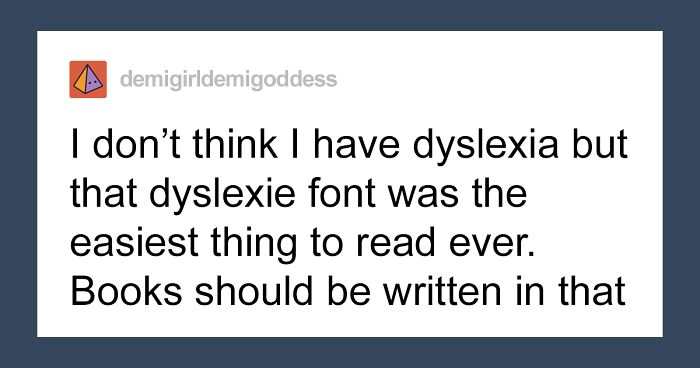
This Tumblr Thread On Dyslexia-Friendly Fonts Will Change The Way You Think Of Comic Sans And Other Not-So-Popular Fonts
It’s the font that appalls graphic designers, makes typographers cringe, and has been relentlessly mocked on the internet in instances like the famous Doge meme. In 1999, two graphic designers, Dave and Holly Combs, even started a movement to ban it. I am talking the font that has divided (or rather united?) an entire generation—the blessed and the cursed Comic Sans.
And while the only ones with a soft spot for Comic Sans are often primary and secondary school children, this Tumblr thread has put a whole new perspective on the font. In an attempt to win back the love it really deserves, the thread has explained how some of our least popular fonts are perfect for dyslexic people with difficulty in reading.
Incredibly, Comic Sans is not the only dyslexia-friendly font, so read the thread in full to find out why Times New Roman doesn’t have to be your default typeface.
This Tumblr thread has shed light on dyslexia-friendly fonts and it explains why Comic Sans deserves far more love
Image credits: lavandulum
Image credits: not-safe-for-earth
Image credits: not-safe-for-earth
Image credits: invaderxan
Bored Panda reached out to Victoria Buylaert, a graphic designer and social media manager who currently resides in Belgium who was happy to share some insights on Comic Sans and dyslexia-friendly fonts. Victoria runs Captain Creative, a graphic design & social media management studio based in Belgium.
When asked why Comic Sans has become such a widely disliked font, Victoria said the biggest reason is the way the font is used. “Vincent Connore (the creator of comic sans) created the font to put in a speech bulb of a cartoon for Microsoft Bob. Originally the text in the bulb was in Times New Roman, but he found it too serious a font to use, so he designed Comic Sans. Which is also inspired by comics as well.”
Image credits: sweetheart-sona
Image credits: anastasiaoftheironwood
Image credits: writernotwaiting
Image credits: iamhisgloriouspurpose
Image credits: catwinchester
Victoria also explained that Comic Sans is a font that is “more ‘childish’ and pretty ‘informal.’” Hence, it’s used on “birthday invitations, warnings like ‘do not disturb’ that are written in Microsoft Word and then printed and put on the door. Or t-shirts with some kind of cheesy sentence that is sold in souvenir shops all over the world.”
The graphic designer said that she wouldn’t immediately use it in her design (“whether that is social media content or your logo”), “because of the overuse of Comic Sans (see examples above) and the perceptions people created of the font over time.”
The common fear is that it may easily come across as “‘unprofessional,’ ‘not to be taken seriously,’ a ‘joke.’ Or it may look like you didn’t feel like investing in your brand so you just made something in Word, so to speak,” Victoria added.
Image credits: catwinchester
Image credits: pitbullmabari
Image credits: demigirldemigoddess
Image credits: lunariens
Having said that, Victoria added that in some situations, the font can absolutely be used. “If you make a meme, for example, or you’re designing something that fits the perceptions people have of the font.” When asked if it’s a bad font, Victoria believes that’s a discussion that can go on for a long time. “Obviously, the font was designed for a reason, so it can be used in a fitting context, in my opinion,” she added.
But when it comes to people with dyslexia, using Comic Sans can be a wonderful solution. “The font someone with dyslexia prefers is subjective. There’s no ‘one font fits all.’ It’s a personal choice. But Comic Sans has been considered a dyslexia-friendly font,” she explained.
Image credits: hashtagyourshirt
Image credits: welcometotheravenclawcommonroom
Image credits: ta-lunelle
It turns out, one of the most disliked fonts probably ever to have existed, the infamous Comic Sans, is recommended by the British Dyslexia Association and the Dyslexia Association of Ireland. In addition, the American Institute of Graphic Arts post from last summer stated that it’s likely the best font for people with dyslexia thanks to its “character disambiguation” and “variation in letter heights.”
Of course, there are fonts that have been designed specifically to help dyslexic people with reading difficulties, and those are Dyslexie and OpenDyslexic. However, they are not as readily available as Comic Sans.
Image credits: kedreeva
According to Lauren Hudgins, whose sister has a learning disability, “The irregular shapes of the letters in Comic Sans allow her to focus on the individual parts of words.”
“While many fonts use repeated shapes to create different letters, such as a ‘p’ rotated to made a ‘q,’ Comic Sans uses few repeated shapes, creating distinct letters (although it does have a mirrored ‘b’ and ‘d’).” The ubiquitous Times New Roman, with all its serifs, is often illegible,” she explained in a piece for The Establishment.
With that in mind, the campaign to ban Comic Sans that was launched in 1999 doesn’t look that innocent. “Using Comic Sans is like turning up to a black-tie event in a clown costume,” the campaign’s co-founder Holly Combs stated a while back.
But no matter how aesthetically troubling it would look to a picky eye in typography, if it’s helping people with reading disabilities, that’s already reason enough to give the infamous font the recognition that it really deserves.
And this is what people had to comment
I love Verdana, that's the font I use the most. And now, I just learnt that it's even a dyslexia-compatible font! Wow.
For some people it works well. Wish I could read it well, make my life easier.
Load More Replies...I find Comic Sans much better than the others, except Dyslexie, that is the best for me. I feel like they have some similarities. Font shaming on Comic Sans is such clichéd ableist garbage, and really of all the difficulties that come with dyslexia, dismissing the font opinion of self appointed aesthetic police isn't too hard.
Tahoma should be about as widespread, and easier than Comic Sans?
Load More Replies...I don't believe anyone really hate Comic Sans. It is just popular public opinion. Some people are very susceptible for peer pressure.
I love Verdana, that's the font I use the most. And now, I just learnt that it's even a dyslexia-compatible font! Wow.
For some people it works well. Wish I could read it well, make my life easier.
Load More Replies...I find Comic Sans much better than the others, except Dyslexie, that is the best for me. I feel like they have some similarities. Font shaming on Comic Sans is such clichéd ableist garbage, and really of all the difficulties that come with dyslexia, dismissing the font opinion of self appointed aesthetic police isn't too hard.
Tahoma should be about as widespread, and easier than Comic Sans?
Load More Replies...I don't believe anyone really hate Comic Sans. It is just popular public opinion. Some people are very susceptible for peer pressure.

 Dark Mode
Dark Mode 

 No fees, cancel anytime
No fees, cancel anytime 


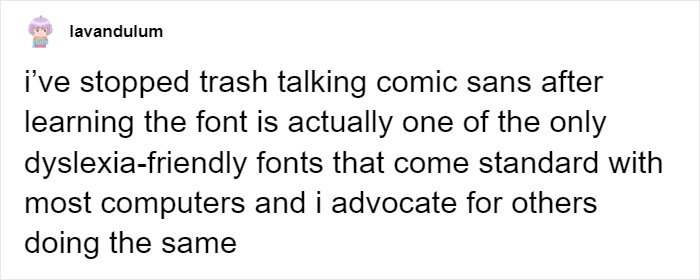
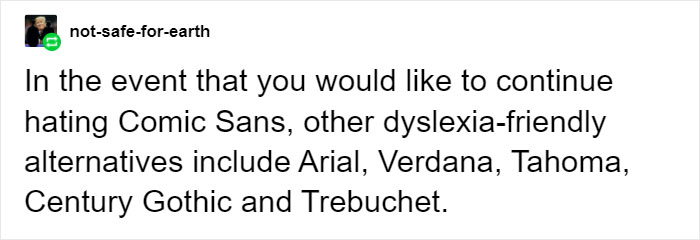

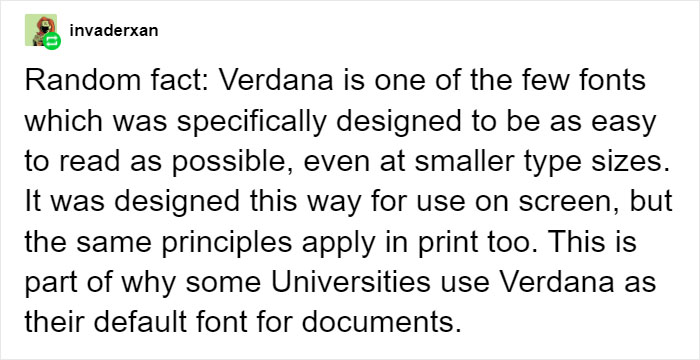










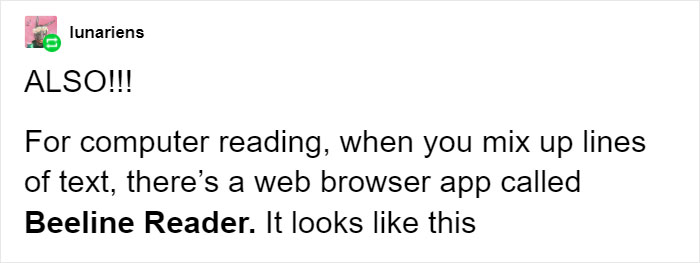
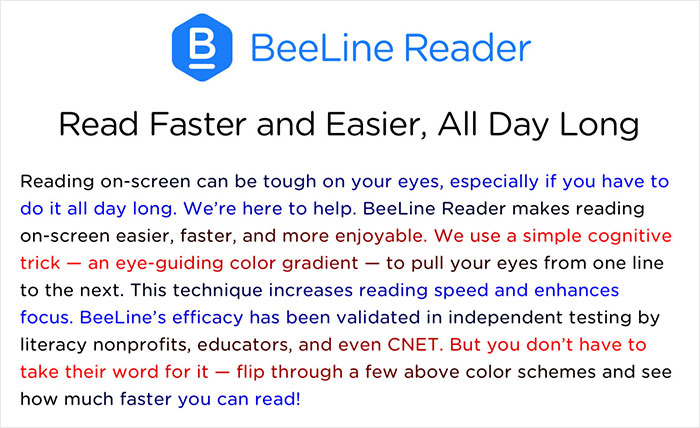




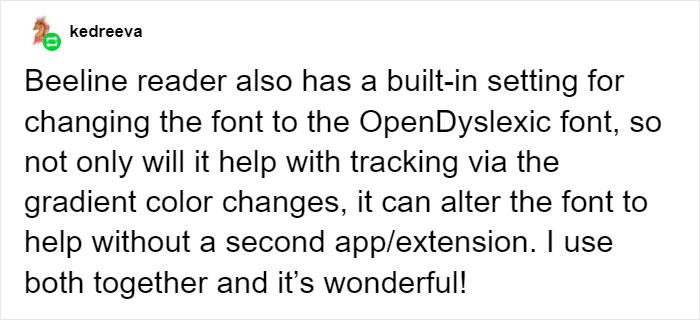


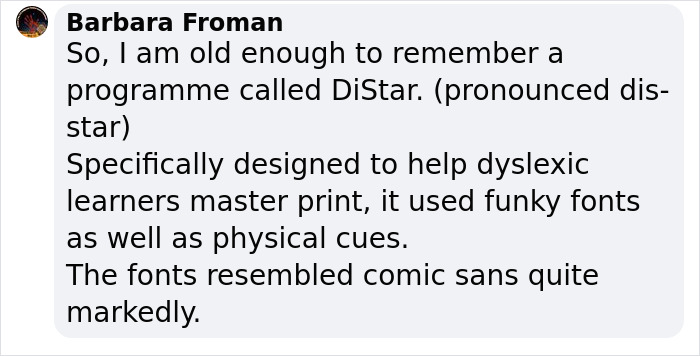

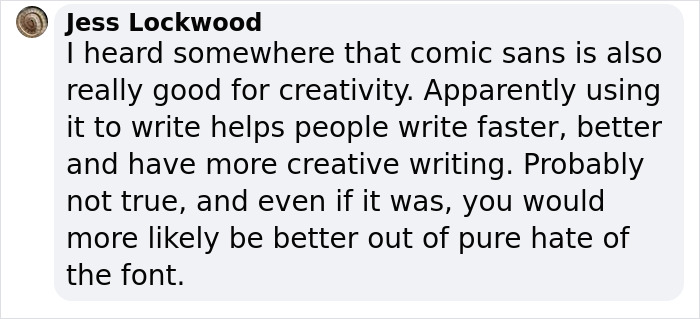
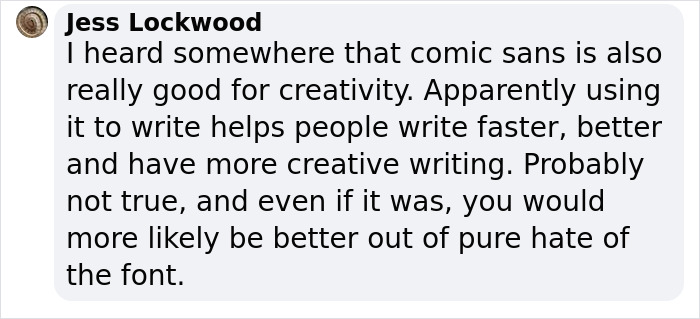
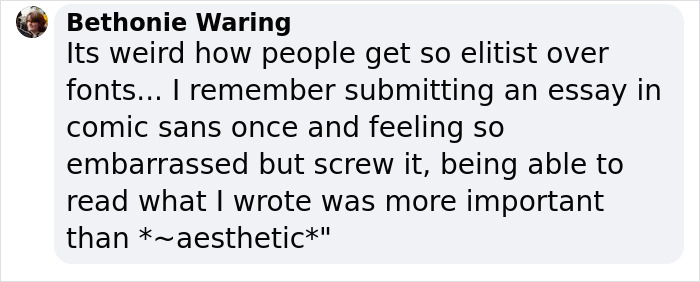


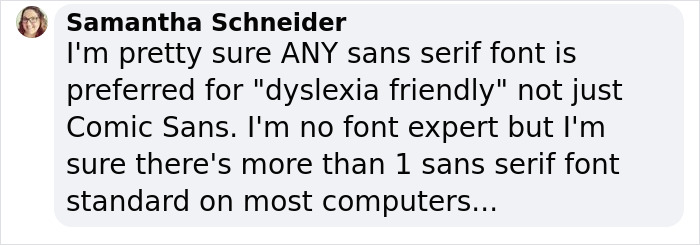












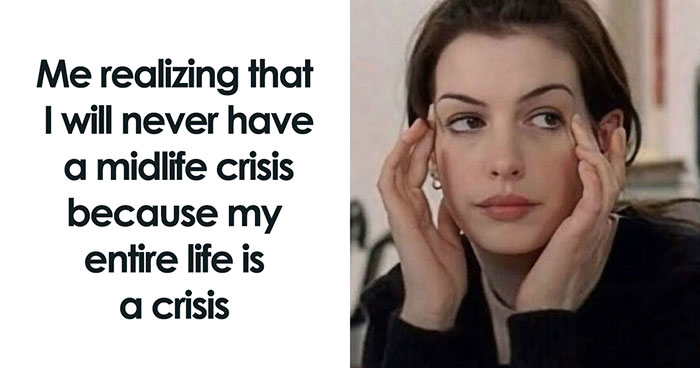































120
30